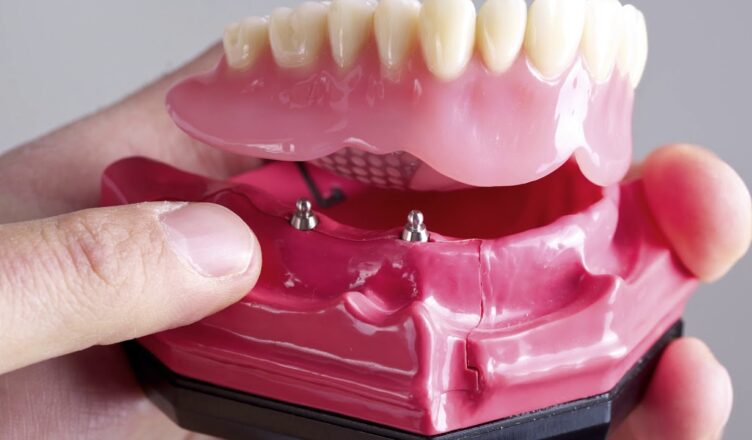Dental implants are artificial teeth that look and function just like natural teeth, and they are attached to metal screw-like posts that serve as replacement tooth roots after surgery. In cases where a lack of natural tooth roots makes it impossible to construct dentures or bridgework, dental implant surgery might be a welcome alternative to poorly fitting dentures or bridgework.
The specifics of your dental implant procedure will be tailored to the specifics of your jawbone and implant. Surgery for dental implants may require more than one stage. The main advantage of dental implants is that they provide stable support for replacement teeth. This is accomplished by having the bone heal securely around the implant. Since time is needed for the bone to recover, this procedure can take many months.
Why Implant Retained Dentures?
Dentures are an option for people who have experienced significant dental loss. It’s becoming increasingly common for patients to opt for implant retained dentures instead of standard removable dentures.
There are many reasons why implant retained dentures are preferable to conventional dentures.
Replacement dentures are nothing more than an artificial set of teeth. Dentures can either be a partial set or a full set. Plastic frames hold prosthetic teeth that mimic natural ones. This is not merely a cosmetic enhancement but a replacement for missing teeth. Significant health repercussions are associated with missing teeth, including the inability to eat and speak correctly. Replacement teeth, or dentures, can solve this issue.
Inadequate bone density is a further issue associated with tooth loss. Your smile can be restored to its former glory with the help of implant-retained dentures. The teeth play an important role in supporting the rest of the face, so taking care of them can help you seem younger for longer
For the most part, dental implants are a good option if you:
- have a missing tooth or teeth
- possess a fully developed jawbone
- have healthy bone tissue or the option of a bone graft to support the implants
- maintain a strong and healthy mouth
- Ensure you’re not dealing with anything that could slow down your bones’ ability to repair
- Aiming to strengthen your oratory skills?
- Avoid tobacco use at all costs.
Preparation For Implanted Retained Denture
A dentist who specializes in treating the structures that support the teeth, such as the gums and bones (periodontist), a dentist who specializes in designing and fitting artificial teeth (prosthodontist), and even an ear, nose, and throat (ENT) specialist may all be involved in the planning process for dental implants.
Due to the invasive nature of getting dental implants, a comprehensive evaluation is required before the treatment. This evaluation should include:
- In-depth dental checkup. Dentists can take X-rays, 3D pictures, and impressions of your teeth and jaw to create a detailed model of your oral anatomy.
- Examining your past health records. Always be honest with your doctor about your health history and any medications you’re taking, both prescription and over-the-counter. Before surgery, antibiotics may be prescribed if you have a preexisting medical condition, such as a heart problem or orthopedic implants.
- Course of action. The number of missing teeth, the health of the jawbone, and the remaining teeth will all play a role in the final cost of this customized solution.
During surgery, local anesthesia, sedation, or general anesthesia can be used to alleviate discomfort. Before deciding, consult your dentist to find out what treatment is ideal. Depending on the type of anesthetic you’ll receive, your dental care team will give you specific instructions regarding what you can and can’t eat and drink before the procedure. If you’re undergoing general anesthesia or sedation, arrange to have someone drive you home following the procedure and prepare to sleep for the rest of the day.
Expectations from Implant Retained Dentures
Dental implant surgery is typically an outpatient operation that requires multiple visits over a period of time to allow for healing. There are several stages involved in implant dentistry, including:
- Treatment for a broken tooth involves extraction
- Preparation (grafting) of the jawbone
- Implants in the mouth
- Osteogenesis and bone repair
- Situating Abutments
- Insertion of artificial Teeth
From beginning to end, this can be a lengthy procedure that takes many months. Most of that time will be spent resting and letting new jawbone grow in. Some processes can be streamlined if you have the right situation, method, and supplies.
After the process
Dental implant surgery, whether performed in one or many phases, can cause some of the same common side effects as other dental procedures:
- facial and gum swelling
- Experiencing skin and gum bruising
- discomfort at the implant location
- Bruising and Slight Bleeding
After getting dental implants, you could require painkillers or antibiotics. Contact your oral surgeon if swelling, pain, or any other issue worsens in the days following surgery.
It is recommended that you stick to soft foods immediately following each surgical procedure to help speed up the healing process. Your doctor may likely employ dissolvable sutures. The doctor will remove your stitches if they don’t dissolve on their own.
References:
1: Interventions for replacing missing teeth: different types of dental implants
Publishing date: 22 July 2014
https://doi.org/10.1002/14651858.CD003815.pub4
2: Selection of artificial teeth
Publishing date: 5 August 2006
https://doi.org/10.1016/0022-3913(67)90185-0
3: Dentists’ prescribing of antibiotics and opioids to Medicare Part D beneficiaries: Medications of high impact to public health
Publishing date: 18 June 2018
https://doi.org/10.1016/j.adaj.2018.04.027

